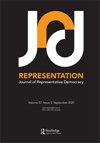Fighting COVID-19 on Democratic Terms. Parliamentary Functioning in Italy and Denmark during the Pandemic
Q2 Social Sciences
引用次数: 5
Abstract
ABSTRACT The COVID-19 pandemic challenged parliamentary decision-making, which is normally based on time-consuming deliberation and scrutiny. We ask how national parliaments met this challenge during the first wave in the spring 2020, and we argue that institutional powers of the executive designed to handle crises just like a pandemic, paradoxically, increase challenges to democratic decision-making because the parliament misses opportunities to negotiate institutional adjustments accommodating pressure of government takeover. We evaluate this argument based on a comparative study of parliamentary activity in Italy and Denmark during the first wave of COVID-19 and find that both parliaments came under pressure with regard to law-making and control, but only the Danish parliament was able to install effective mechanisms to regain lost powers. It is too early to conclude on parliamentary consequences of COVID-19, but our study suggests that parliamentary reforms in response to the COVID-19 democratic challenges will mainly manifest in political systems without strong institutions to handle states of emergency.以民主的方式抗击COVID-19。大流行期间意大利和丹麦议会的运作
COVID-19大流行挑战了议会决策,这通常是基于耗时的审议和审查。我们询问各国议会是如何在2020年春季的第一波浪潮中应对这一挑战的,我们认为,行政机构的机构权力旨在处理像流行病一样的危机,矛盾的是,这增加了民主决策的挑战,因为议会错过了谈判制度调整以适应政府接管压力的机会。我们通过对意大利和丹麦在第一波新冠肺炎疫情期间议会活动的比较研究来评估这一论点,发现两国议会在立法和控制方面都面临压力,但只有丹麦议会能够建立有效的机制来重新获得失去的权力。现在就2019冠状病毒病对议会的影响作出结论还为时过早,但我们的研究表明,为应对2019冠状病毒病的民主挑战而进行的议会改革将主要体现在没有强有力的机构来处理紧急状态的政治制度上。
本文章由计算机程序翻译,如有差异,请以英文原文为准。
求助全文
约1分钟内获得全文
求助全文
来源期刊

Representation
Social Sciences-Sociology and Political Science
CiteScore
3.50
自引率
0.00%
发文量
31
期刊介绍:
This change in scope follows two paths. Firstly, it seeks contributors who are interested in exploring the interface between democratic practice and theory. In particular, this focus seeks contributions that apply theoretical insights to actual examples of current practice. Secondly, while not neglecting the current focus of the journal, we would like to expand its international coverage so that the journal will offer our readers insights in the state of democracy worldwide.
 求助内容:
求助内容: 应助结果提醒方式:
应助结果提醒方式:


